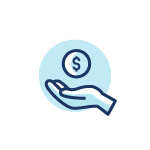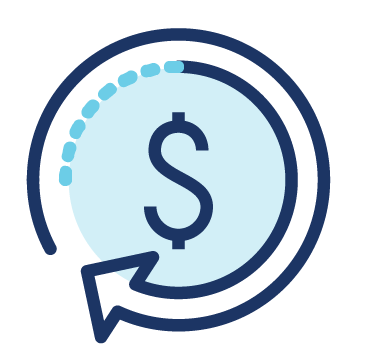Key Takeaways
- A cash-out refinance calculator can help you compare loan options, including different loam amounts, interest rates, and terms, to help you make informed decisions.
- Speak with a mortgage loan officer or financial advisor before making a final decision based on your calculator results.
- Consider the impact on your long-term financial goals as you decide whether a cash-out refinance is the right choice for you.
Over the past few years, homeowners have experienced a steady increase in the value of their homes . As a result, many are wondering if a cash-out refinance is a good fit.
What is a Cash-Out Refinance?
A cash-out refinance is a type of mortgage refinance that pays off the existing mortgage and creates a brand-new mortgage linked to the increased value of the home. A borrower may receive cash for a portion of the home’s equity, which in this case will be calculated by taking the difference between the new mortgage amount (less closing costs) and the amount owed on the existing mortgage.
This process results in converting your equity into cash and creating a brand-new mortgage, which may have different terms and rates.
How Do I Determine the Home Equity Amount?
The equity you have in your home is equal to the appraised value of your home minus any first or second mortgage, or any other liens you have on your home.
With that said, over time a homeowner will see the equity increase in their home for two reasons:
- The value of the home increases
- The primary mortgage is typically paid down through monthly mortgage payments
For example, let’s assume you purchased a home for $300,000 five years earlier with a 20% down payment of $60,000. You started with a mortgage balance of $240,000 and after five years, you paid the principal of your mortgage down to approximately $215,000. The current appraised value of your home is now $400,000, resulting in a total equity of $185,000.
Current Appraised Value
$400,000
Current Mortgage Balance
$215,000
Home Equity
$185,000
What are the Steps to a Cash-Out Refinance?
Unlike a traditional refinance which replaces your current mortgage with a new mortgage for a similar balance, a cash-out refinance creates a new mortgage for more than you currently owe.
1 Determine the available equity in your home.
To determine your equity, estimate the value of your home and the balance on your primary mortgage. The difference between the value of your home and your current mortgage balance is your home equity.
Keep in mind, this is only an estimation. To determine the exact value of your home requires a home appraisal, which you won’t get until you actually apply for the cash-out refinance.
Also, if you have a second mortgage, or any other liens on your home, make sure to subtract that amount in addition to the primary mortgage balance from your estimated home value.
2 Get your finances in order.
The lender will determine the requirements when it comes to qualifying for a cash-out refinance. However, it’s very common for lenders to require the following:
Credit Score 620 or Higher: Most lenders will require a credit score of 620 or higher to do a refinance. However, some lenders may require a score higher than 620 to do a cash-out refinance.
Proof of Income and Employment: If you are a W-2 employee, you’ll need copies of your last two pay statements. It’s also a good idea to have the last pay statement from the previous year to show bonus or overtime you collected during that year. If you are self-employed, a freelancer or independent contractor, you must provide your current profit and loss statements and two year’s tax returns.
Assets: Your lender will require a list of your assets. Gather the previous 60 days’ worth of all bank statements, retirement account statements and other brokerage accounts you may have.
Debts (Liabilities): Your lender will also want to see your current debt payments compared to your income before approving your application. This is called your debt-to-income ratio.
Additionally, list your monthly debt payments such as auto loans, student loans, credit cards and other debt payments you make each month. You will also be asked to provide the most current mortgage statement.
3 Apply for the new loan.
Now that you have your documents gathered, it’s time to apply for the cash-out refinance. Typically, credit unions and local banks will offer lower interest rates as compared to the larger national banks.
Applications can be taken over the phone, in person at a branch location or online.
How Much Cash Can I Get on a Cash-Out Refinance?
The amount of cash you receive in a cash-out refinance will be less than the equity amount. Generally, you can typically access up to 80% to 90% of your home's current appraised value through a cash-out refinance. On a first mortgage, lenders often require you to maintain 20% equity in your home. However, a LTV over 80% would require Mortgage Insurance and must adhere to the MI Cash-Out requirements.
However, your credit score, debt-to-income ratio , and other financial factors can impact the exact amount you qualify for.
Cash-Out Refinance Example
Let's assume your home appraises for $400,000 and the current mortgage balance is $215,000. In order to maintain 20% equity in your home, the maximum available cash-out in this scenario is $105,000*.
Appraised Value
$400,000
LTV
80%
New Mortgage Amount
$320,000
New Mortgage Amount
$320,000
Current Mortgage
$215,000
Cash-Out Maximum
$105,000
*Keep in mind that there will be some closing costs associated with the new loan. So, the amount of cash you receive at closing may be lower.
By moving forward with the cash-out refinance, you pay off the existing $215,000 mortgage, receive approximately $105,000 in cash, and create a brand-new mortgage for approximately $320,000.
Your new mortgage payment will be based on the new terms, rates, and the new loan balance you and your lender agree to.
Cash-Out Refinance Calculator
Our user-friendly Cash-Out Refinance Calculator makes this process easier for you. The calculator takes into account your home's current value, your existing mortgage balance and your loan-to-value (LTV) ratio. Then it provides you with an estimate of how much cash you can access through a cash-out refinance.
Cash-Out Amount: $0
If result is negative, you will not be able to access cash through a cash-out refinance.
How to use our Cash-Out Refinance Calculator
- Enter your home's value: Input the current appraised value of your home.
- Loan-to-Value (LTV) ratio: This is calculated by dividing the amount of the loan by the appraised value or the purchase price of the property, whichever is lower. LTV is typically expressed as a percentage and represents the maximum portion of your home's value you can borrow against.
- Outstanding Mortgage Balance: Enter the outstanding balance on your existing mortgage.
Top Reasons for Cash-Out Refinance
A Lower Interest Rate
With a cash-out refinance, you may be able to switch out a higher original interest rate for a new lower rate. Depending on the new interest rate and loan amount, this might save you thousands of dollars in interest as you pay off the new loan.
Home Improvement
Home improvements are one of the most common reasons to take advantage of a cash-out refinance. It gives homeowners a way to pay for renovations and improve the home's appeal. An added benefit is that you're using the equity in the home to further improve its value.
Debt Consolidation
Debt consolidation is another reason to utilize a cash-out refinance because often you're taking debt with a higher interest rate and consolidating the debt into a lower interest rate. However, this may not be the best financial move for everyone and there are associated risks to aware of.
The first thing to consider is that most high-interest debt is unsecured debt. Unsecured debt doesn't have collateral for the debt, which is why the banks charge higher interest rates. As soon as the debt is moved and secured using your home as collateral, the interest rates decrease because a portion of the risk just transferred from the lender to the borrower.
A common misconception is that the borrower believes they're paying off debt with a cash-out refinance. However, the reality is that the debt is simply being moved from one place to another. You haven't actually paid off the debt, but the interest rate and terms of the debt have changed.
Is it a Good Idea to Cash-Out Refinance?
While a cash-out refinance can be a valuable financial tool, it's not the right choice for everyone. Consider the following factors to determine if a cash-out refinance is the best decision for you:
- Interest rates: Compare the interest rate on your current mortgage with the new rate. If it's higher, a cash-out refinance will likely not be cost-effective.
- Fees and closing costs: Factor in the fees and closing costs associated with the refinance. Ensure that the potential benefits outweigh these expenses.
- Long-term goals: Will accessing your home's equity help you achieve your long-term financial goals?
- Monthly payments: Be prepared for potentially higher monthly mortgage payments if you cash out a significant amount.
- Credit score: Your credit score plays a crucial role in the approval process and the interest rate you'll receive.
Before making a decision, consult with a financial advisor or mortgage professional to assess your unique situation thoroughly.
Other Things to Consider
As straightforward as a cash-out refinance is, there are still some things to know before you apply. Here are important considerations to keep in mind when choosing a cash-out refinance.
Home Equity Loan vs HELOC vs Cash-Out Refinance
A cash-out refinance, a home equity loan and a home equity line of credit (HELOC) all utilize the equity in your home, however there are significant differences.
Like a cash-out refinance, a home equity loan is a lump-sum installment loan guaranteed by the equity in your home. The major difference is the home equity loan is actually a second mortgage on your home (usually with a higher interest rate), whereas a cash-out refinance is a brand-new first mortgage.
A HELOC is typically a second mortgage, structured as a revolving line of credit, that is that is secured by the equity in your home. A HELOC gives you access to a credit line that you can draw from and pay back over a period of time.
There Will Be Closing Costs
There will be closing costs associated with the refinance. These costs include appraisal fees, attorney/title fees and credit report fees, etc. Generally, most refinance transactions incur approximately 2% of the new loan amount in closing costs which can be rolled into the loan. Closing costs may be higher if you choose to buy the interest rate down to lower than the prevailing market rate. Additionally, either scenario will result in reduced cash to you at closing.
Speed
If you have gone through the process of obtaining a mortgage loan before, you know this is not something that happens overnight. A cash-out refinance is similar and generally takes 30-45 days to complete.
Once the loan is approved, the Truth and Lending Act provides an additional 3-day right of rescission (cancellation clause) from the day the documents are signed. Therefore, borrowers can expect to receive their check 5-7 days after closing.
The Loan Terms May Change
Remember, with a cash-out refinance, the original mortgage loan is paid off and replaced with a new loan. This new loan may have a different rate, a different term and a new monthly payment.
For example, if you are five years into a 30-year mortgage and you do a cash-out refinance with a new 30-year loan, your payment schedule will start over again. Also, depending on your new interest rate and the amount you cash-out in the refinance, it could increase your monthly payment.
Talk this over with your lender and look at the closing disclosure to ensure you fully understand the terms of your new loan.
A cash-out refinance can provide access to your home's equity, allowing you to accomplish other financial goals. To determine how much cash you can get and whether it's the right move for you, use the Cash-Out Refinance Calculator as a starting point. Remember that this tool provides estimates, and you consulting with a qualified financial expert is your best bet to make an informed decision.
APR = Annual Percentage Rate




